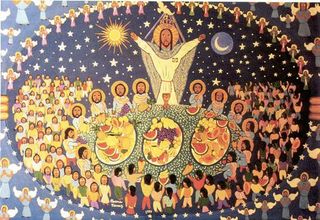Reading 1: 2 Kings 4:8-11, 14-16a
Responsorial Psalm: Psalms 89:2-3, 16-17, 18-19
Reading 2: Romans 6:3-4, 8-11
Gospel: Matthew 10:37-42
It is very easy to hear in these readings the need to sacrifice ourselves for the sake of others. It is strongest with the gospel reading. Jesus says to save your life, lose it. He calls his followers to leave behind their mothers and fathers, sons and daughters. His disciples are to sacrifice their own interests for others. Paul also speaks of this same kind of sacrifice. He insists that believers are to “die with Christ” and to think of ourselves as “dead to sin.”
Along with this sacrificial theme, however, is another one that values assertion and action. One sees this in the first reading, where “a woman of influence” insists both that Elisha dines with her and her family and instructs her husband to build a room for Elisha.
While both of these themes are important, neither of them are sufficient by themselves. Too often, the weak and vulnerable are told to sacrifice and so do not build up a Godly resolve to urge and do what is good. Too often, the people of influence can insist on their way, becoming narcissists and never heeding the demands that others’ dignity places on them. Together, though, the influential are reminded to use their power to aid others, and the vulnerable are encouraged to act up and do what is good. Together, they build each other up, and, in doing so, something greater emerges.
Ultimately, each of the readings emphasizes this sacrifice and resolve and, as result, a “reward.” Paul calls the people to “die with Christ” so that they might “die no more.” We “die” not as a way to destroy ourselves but as a way to free ourselves from the destructive power of sin. The result is a “newness of life” and a life “for God” and “in Christ Jesus.”
It is the same with the “woman of influence.” Her resolve is not for any selfish gain but because it is the right thing to do. She knows “that Elisha is a holy man of God” and so rearranges her home so as to accommodate him. This hospitality results in a blessing: the birth of a child.
Likewise, Jesus’ teaching about leaving family is not to cut one’s self off from others. Rather, it is so one might be more open to others beyond the family.
Whoever receives a prophet because he is a prophet
will receive a prophet’s reward,
and whoever receives a righteous man
because he is a righteous man
will receive a righteous man’s reward.
And whoever gives only a cup of cold water
to one of these little ones to drink
because the little one is a disciple—
amen, I say to you, he will surely not lose his reward.
Jesus teaches people to act, not in an egocentrism where one’s concerns is only with one’s self, friend, or family. Rather, it is to act so as to care for all of one’s neighbors, be they as great as a prophet or as small as a little one needing “a cup of cold water.”
Doing so leads to a great “reward.” This reward is not fame, fortune, or power. Instead, it is the heavenly banquet where everyone is united as friends and family around the living God. It is, as the psalmist says, where we “sing” of God’s “goodness,” “faithfulness”, and “strength” and God establishes “kindness” forever and “exalts” the people.




